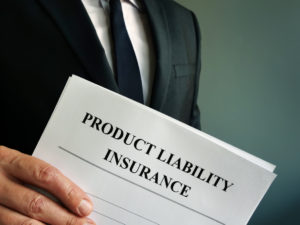Tifton Product Liability Lawyer

Were you hurt by a defective or dangerous product in Tifton, GA? If so, you should contact a Tifton product liability lawyer. An attorney can help you get money to pay for medical expenses, lost wages, property damage, and other losses associated with the accident.
The King Firm Car Accident and Personal Injury Lawyers is composed of award-winning lawyers in Tifton. We know how to hold manufacturers and companies responsible for hurting innocent consumers. Our team can help you get compensation and make sure that the product doesn’t hurt more people in the future.
Contact our office at (229) 386-1376 to schedule a free consultation with a Tifton product liability attorney today.
How The King Firm Car Accident and Personal Injury Lawyers Can Help After a Product Liability Incident in Tifton

You shouldn’t take on manufacturers and other companies responsible for product defects alone. If you were injured, you deserve top-rated legal representation to help you hold them accountable.
Our Tifton personal injury lawyers have decades of combined experience in personal injury law. We’ve recovered millions for clients just like you.
When you hire us, you can count on us to:
- Investigate your accident to gather evidence and identify liable manufacturers and distributors
- Determine whether the product had a manufacturing, design, or marketing defect
- Work with leading experts to help prove your case
- Calculate your damages related to the incident
- Handle all communications and negotiations on your behalf
- Take your case to court to seek fair compensation
Contact us today to schedule a free consultation with a Tifton personal injury attorney. We are standing by to help.
What Is A Product Liability Case?
A product liability case can come in all different shapes and sizes. A product liability lawsuit seeks to hold a manufacturer or distributor responsible for producing or selling a dangerous or defective product.
Companies are supposed to produce and sell products that are safe when used as intended, and that have adequate warning labels of known risks. If a business fails to design a safe product or properly test it, it may be considered negligent.
In Georgia, an injured person can also sue a manufacturer without proving negligence. This is called strict liability. In a strict liability case, it doesn’t matter whether or not the company took reasonable precautions or wasn’t aware of the defect.
Elements Of A Product Liability Case
Under Georgia law, a plaintiff needs to prove the following elements to prevail:
- The product was defective at the time of the injury
- The defect caused injury or death (of the plaintiff or a loved one)
- The product was in the same condition as when it was manufactured or sold
- The item was used for its intended purpose
If the plaintiff can prove each of these elements by a preponderance of the evidence, then they will win the product liability case.
We Handle All Product Liability Cases In Tifton
Our team is highly specialized in all types of product liability cases. The most common cases that we see in Tifton, GA include defective or dangerous:
- Children’s toys and furniture like cribs, swings, and bouncers
- Cars, motorcycles, and bicycles, and their parts
- Medical devices like implants, prosthetics, mesh, and surgical instruments
- Prescription medications
- Pesticides and weed killers
It isn’t unusual for someone to get hurt by a product that isn’t listed. Usually, once a defective product is identified, it is taken off the market through a recall. We help many of our clients navigate unique, one-of-a-kind cases.
Types Of Product Liability Cases
No matter what type of product hurt you, there are three grounds for a product liability case in Georgia.
Defective Design
In a defective design case, you argue that a product was unreasonably dangerous. A product doesn’t need to be completely risk-free. It’s normal for all products to have some inherent risk, by design.
The question is whether or not the risk is unreasonable compared to the benefit of the product. In these cases, the court will also consider whether an alternative and safer design was available.
Manufacturing Defect
A manufacturing defect case happens when the manufacturer makes an error while creating the product. The error must result in an unreasonably dangerous product that hurts you. In a manufacturing defect case, there is usually an issue with the assembly line or a step in the manufacturing process.
For example, if a car manufacturer fails to properly install the airbags so they don’t deploy in an accident, this would be a manufacturing defect rather than a design defect.
Failure To Warn
Most products have some sort of risk associated with them. Businesses must warn customers about foreseeable risks that can happen even if they are using the product as intended. They do not need to warn consumers about obvious risks.
Manufacturers must provide conspicuous and clear warnings of the risk on the packaging or directly on the product. Consumers must also take care to read and heed the warnings and use a product as intended.
For example, a ladder manufacturer may not need to warn their customers that falling from a ladder can result in injury. However, it may need to warn customers of a known weight limit that will likely result in a ladder rung collapsing. The weight limit is not obvious to a consumer and poses a risk even when using the ladder as intended.
Who Is Responsible In A Product Liability Case?
Usually, a company is responsible for a product liability case. Sometimes there may be multiple companies that share the responsibility. In general, the following parties may be named as a defendant in a product liability case:
- The manufacturer of the entire product or defective part (sometimes this may be many different companies)
- The retail store that sold the product directly to the consumer
- The wholesaler or a middleman distributor
Filing a lawsuit against a large corporation can be scary because they have many lawyers and lots of resources to defend themselves. That’s why a Tifton product liability lawyer can help you identify who is responsible and stand up to powerful companies.
Important Evidence In A Products Liability Case
Product liability cases usually involve a lot of evidence. The most important piece of evidence is the defective product. After you seek medical attention, you should take every step possible to preserve the defective product so that you can prove it caused your injuries.
Other evidence in a product liability case includes:
- Medical records and bills
- Company records from the design process
- Manufacturing records
- Prior lawsuits or recalls
- Expert testimony
- Photographs and videos
It can be difficult to obtain all of the evidence you need to prove your case. That’s because usually, the company has the records in its possession. Your lawyer can help you get this evidence during the discovery process.
What Is The Statute Of Limitations In Tifton Product Liability Cases?
A statute of limitations is the time that you have to file a product liability lawsuit. If you have been hurt or a loved one died as a result of a defective or dangerous product, you have two years from the date of the accident or the date of discovering the injury or death to file a lawsuit.
Sometimes it takes years to discover an injury. This is common in cases that involve defective pharmaceuticals, medical impacts, or mislabeled chemicals. The two-year statute of limitations doesn’t start until you discover (or reasonably should have discovered) the injury.
However, there is an exception to this rule. In Georgia, you cannot file a product liability lawsuit more than 10 years after the product was first sold or consumed. It doesn’t matter if you didn’t discover the injury after more than 10 years.
What Damages Can I Get In A Products Liability Case?
An important part of product liability cases in Tifton is proving that you were injured or your property was damaged. You can’t file a case if you haven’t experienced some sort of loss.
Luckily, there are three different categories of damages that you can seek. A Tifton product liability lawyer can help you calculate your damages and tell you if they may be eligible for recovery.
Economic Damages
Economic damages are monetary losses associated with your injury or property damage. These losses are easy to calculate because the value is known. For example, you may have receipts, bills, and estimates recording these costs.
In products liability cases, the most common economic damages include:
- Medical bills and expenses
- Physical therapy
- In-home or long-term care
- Property repair or property replacement costs
- Medical devices like wheelchairs or prosthetics
- Prescription costs
- Diagnostic testing
- Lost wages
- Lost earning capacity
You can also recover economic damages for anticipated future losses. For example, future medical bills, necessary follow-up surgeries, and future lost wages.
Non-Economic Damages
Non-economic damages are non-monetary losses and are highly personal. This category of damages usually accounts for the emotional and psychological impact of an injury or traumatic incident. Non-economic damages vary from person to person but usually include:
- Pain and suffering
- Loss of enjoyment of life
- Emotional distress
- Loss of consortium
- PTSD, anxiety, and depression
Your personal injury lawyer can help you calculate the value of these losses.
Punitive Damages
Punitive damages punish the defendant for bad behavior and are not tied to your specific losses. You can ask for punitive damages if the defendant’s behavior was reckless or they engaged in intentional misconduct. An example is if a company conceals a known defect. You must prove this with clear and convincing evidence.
It is difficult to prove punitive damages in product liability cases because you need to establish a state of mind. The strict liability theory applied to manufacturers means that you don’t need to prove that they were negligent. That means punitive damages are generally only available if you are filing a product liability claim based on negligence.
What Should I Do If I Am Blamed For My Injuries?
Sometimes a product is dangerous or defective and the consumer uses it improperly. Both of the parties contributed to the injury. As long as you are no more than 49% responsible for causing the accident, you can recover damages. However, your total compensation is reduced by the percentage of responsibility that you have.
For example, if an oven is defective and heats up to 100 degrees hotter than it displays, it is defective and dangerous. However, if you don’t use an oven mitt to take out your food and get burned, you may be partially to blame. If you are 30% responsible and the oven manufacturer is 70% responsible, you will recover 70% of your damages.
Contact A Tifton Product Liability Lawyer For A Free Consultation
If you are ready to speak with a Tifton product liability lawyer, contact The King Firm Car Accident and Personal Injury Lawyers Injury Law to set up a free consultation. We can help you file a product liability lawsuit and stand up to powerful companies to get the compensation you deserve.
Visit Our Personal Injury Law Office in Tifton, GA
The King Firm Car Accident and Personal Injury Lawyers
1603 US Hwy 41, Tifton, GA 31794
(229) 386-1376
